Companies and ventures in which PREVI participates
Management and performance
Management of environmental impacts
Companies in which PREVI participates
At present, 25 companies in which PREVI participates (83 % of total) carry out actions aimed at improving the environmental performance in the value chain. In general, such initiatives presuppose an engagement and a joint action together with suppliers, clients ands other publics who integrate that chain.
Among the most recurrent practices are the development and the requirement of legal conformity by all suppliers, particularly those who provide goods and services and that are considered to be the most critical to the company's activities; the promotion of dialogues and events; and the evaluation of the environmental performance of products and services during their life cycle.
To invest in the increase of efficiency in the processes that involve the production or the processing of non renewable natural resources is another initiative fairly widespread, performed by 93 % of the companies covered by the survey.
Several programs are implemented aiming at mitigating environmental impacts, focused on investments in technological innovations, energetic efficiency programs, water recycling, constant improvement in processes, stimuli to conscious consumption by the internal and external publics, and substitution of non renewable natural resources by renewable resources.
Although with a lesser degree of adhesion by the companies in which PREVI has invested, there are also programs aimed at the management and / or minimization of post-consumption environmental impacts of their products and services, and that have been adopted by 50 % of the companies under survey. Stand out in this case the programs aiming at the collection specific residues, like batteries and heavy oils, and the recycling of post-consumption products.
Around 90 % of the companies dedicate large investments in the R & D of new technologies with a view of reaching a better balanced approach at the critical aspects of sustainability in their operations. The items under consideration, according with the companies, are an eco-efficiency in their production, the development of biodegradable products, the use of alternative energies (particularly through biomass and wind [eolian] energy), and the creation or improvement of environmental control systems.
Environmental aspects in management (% of companies surveyed*)
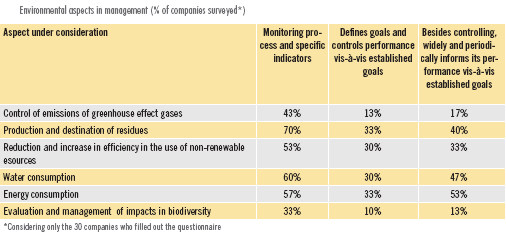
Real estate ventures
Several measures were adopted by the commercial undertakings during the last few years aiming at improving the accessibility conditions and to conform with the legal requirements and prescriptions of Associação Brasileira de Normas Técnicas - ABNT (Brazilian Association of Technical Rules).
More than one half of the establishments in which PREVI has invested follows the rules established concerning accessibility, like reducing the height of the doorsteps; adaptation of the toilets, drinking fountains, turnstiles, counters, and elevators; installation of button panels in elevators and in other places with numbers in Braille alphabet, and construction of ramps, among other adaptations.
The rational use of water and electric energy is common practice in all real estate ventures in which PREVI participates. Over 90 % of them take also steps to reduce the consumption of products and inputs and promote the selective collection of residues, and the reutilization of recycled materials in their daily administrative activities or in construction works in the premises.
Despite that, it is not yet common practice among the real estate ventures the existence of a formal sustainability committee, or of a program which would integrate all socio-environmental actions and engage the customers in an awareness campaign. . Only 17 % of the ventures admitted having structures or initiatives similar to the ones above described.
Personnel management
Profile of the internal public
At the end of the period the companies and real estate ventures in which PREVI has invested counted with a staff of 532,220 employees in their functional ranks. That represents a 3 % decrease in relation to 2008.
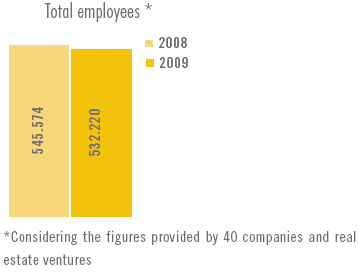
Those figures include all employees who posses a work card duly signed and enjoy all labor rights in accordance o the C.L.T. (Consolidation of Labor Laws). It is worth pointing out that those figures do not include the employees from three large companies in which PREVI participates and failed to inform their total amount of employees in 2009. In 2008, those three companies alone employed more than 147, 421 people.
Among the companies in which PREVI participates, financial institutions were responsible for approximately one half of the job positions.
The food, telecommunications, machinery and electric equipment sectors also presented large numbers in number of employees.
Approximately 43 % of all employees worked in the Southeast Region in 2009.
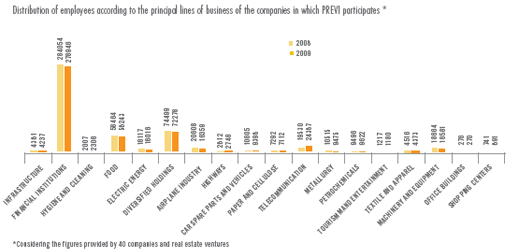
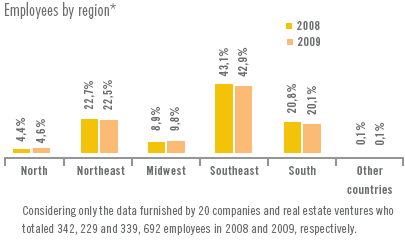
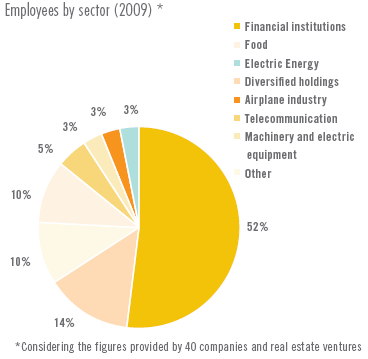
Diversity
The appreciation of diversity is an aspect which demands a continuous attention by companies. It is a fundamental prerequisite to assemble teams capable of dealing with different points of view. That characteristic enhances the innovation opportunities and contributes to speed up answers and the possibility of anticipating market trends. Further to companies's limitations, the initiatives aiming at the appreciation of diversity are a form of contributing to the creation of opportunities aiming at the inclusion of social groups who have historically faced barriers to access the labor market.
The actions aimed at the appreciation of diversity may include policies formally established as a means of collaborating with the creation of an organizational climate in which differences are welcomed, so as the creation of programs and affirmative actions.
Out of the companies in which PREVI participates, 19 (63 %) declared having processes and / or procedures aimed at the valorization of diversity. As to the real estate ventures, only 22 % already deal in some or other way with that issue.
In 2009, women represented 42% of total employees in companies and real estate ventures in which PREVI participated.
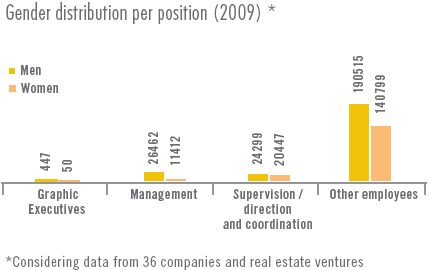
In general, the number of men is superior to that of women in all positions in the last two periods.
In some sectors that gap is even more significant, like in the fields of infrastructure, metallurgy, spare parts / vehicles, and paper / cellulose, all of which show men holding 90 % of the positions.
The sectors which disclose more balanced figures between men and women are the telecommunication and financial ones in which women represent 45 % of total employees. Holdings are the companies which show the highest (72 %) participation of women.
The lowest relative participation of women occurs in executive and managerial positions. Between the last two periods it was noticed a significant increase in the number of women in all positions except in the executive ones, in which the presence of women decreased from 12 % to 10 % in 2009.
At present, one half of the companies in which PREVI participates counts with data which include a map showing the profile of their workforce, including their color / race.
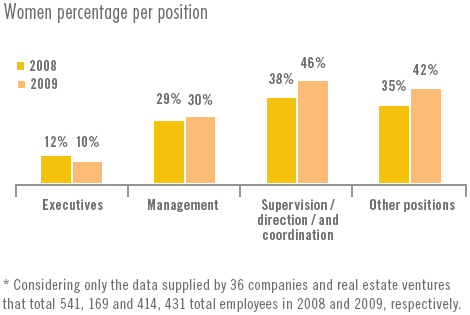
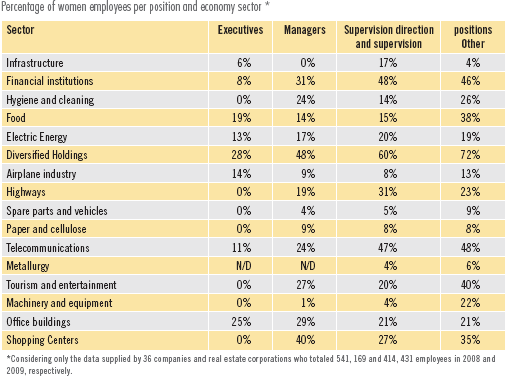
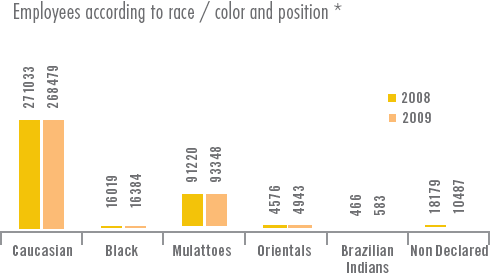
Out of those companies and ventures, only two did not consider the classification guidelines established by the Instituto Brasileiro de Geografia e Estatística - IBGE - and accepted the self-declaration criteria.
Among the real estate ventures, mapping the employees' profile is not yet a common practice. Only one outfit of that segment declared doing it following the IBGE definitions and the self-declaration criteria.
The distribution of employees by color / race in the companies and real estate ventures surveyed indicate the predominance of employees self-declared as white. The latter represent 68 % of all employees considered in the 2009 analysis.
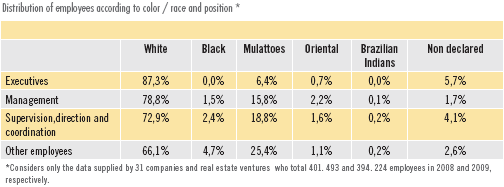
During the period under study, black employees (declared black or mulattoes) represented approximately 28 % of total employees; the orientals, 1 %, and those who did not declare any race / color, 3 %.
The distribution of employees by color / race and position indicates the predominance of people declared white in all positions, with an even more significant predominance in executive and management positions.
The quota reserved by law to disabled people is integrally observed by nine companies, which represent 30 % of the total surveyed. Other six companies declared having signed a "Termo de Ajuste de Conduta" - TAC - (Conduct Adjustment Minute) duly followed up by the competent official organ. Those companies who have not yet fulfilled their quota, have declared being working in that direction and mentioned ongoing agreements with public authorities in that regard in order to analyze specific situations.
Among the real estate ventures, the law is not applicable in 74 % of the cases, due to them not having a minimum of 100 employees, the minimum number specified by law to comply with the quota requirement.
Out of the six real estate ventures in which the quota is applicable, four declare being integrally complying with the law, and one declared having signed a Conduct Adjustment Minute with the Department of Justice.
Remuneration
During 2009 the amount of salaries paid to the collaborators of the companies and real estate ventures in which PREVI participates reached approximately R$23 billion. Stand out the portion of that amount paid to employees in financial institutions and in the petrochemical industry.
Training and qualification
The implementation of initiatives towards the training and qualification of employees is common practice in 78 % of the real estate ventures. Among the training courses and the provisions already mentioned, stand out courses aimed at the professional refinement in several areas, such as customer services / communication, development of leadership qualities, planning and organization, among others, including scholarships for graduate courses.

Relationship with communities
Companies in which PREVI participates
The development of programs and initiatives aimed at the evaluation of the impacts produced by the operations of the companies in local communities is an initiative in force in 83 % of the companies in which PREVI participates.
Those evaluations are generally carried out (in 63 % of the companies) during the activities of the company in the region by means of dialogue initiatives. Carrying out evaluations before starting the operations is usually done by 57 % of the companies surveyed, but only seven companies (23 %) conduct evaluations to estimate the impact produced when closing their activities in a region.
Generally, those evaluations are as much of an environmental nature - in order to mitigate several risks and preserve the ecosystems involved - as are of a socio-economical nature, aiming at understanding in which way the company's operations will affect or already affect the local conditions.
Real estate ventures
Among the real estate ventures, 35 % of those who answered the survey have developed programs and initiatives to evaluate impacts in the neighboring communities. The most common practice is to perform the evaluation during the operations in the region by means of dialogues with the community representatives. Merely 13 % of the ventures accomplish such evaluations before starting their activities.
The main aspects considered in those initiatives are security, traffic and the flow of vehicles in the region, and impacts upon the local businesses.
Private Social Investment
Investing in social action initiatives as a form of contributing in favor of the society is common practice among the companies and ventures in which PREVI participates. Up to the 3rd. quarter of 2009 the amount invested in projects of that nature totaled R$378.7 million. Out of that amount 52 % originate from fiscal incentives, and 48 % from companies' own funds. As to 2008, out of the total of R$510.6 million, 54 % were disbursed by the companies.
Those investments are carried out in different ways and under different levels of involvement, ranging from programs and socio-environmental projects managed by the organizations themselves until the transfer of funds in favor of foundations and institutions, donations and sponsorships.
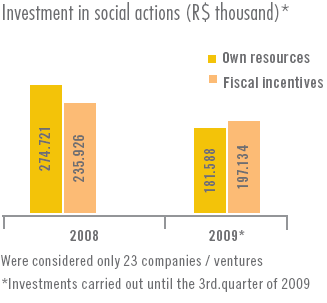
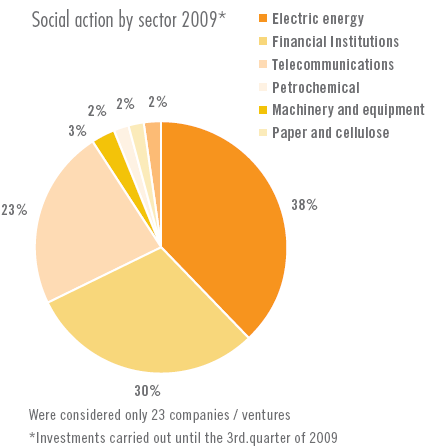
Electric energy, financial institutions and telecommunications sectors were responsible for the most part of the social investments made during 2009. Altogether they totaled 91 % of the total invested in social, cultural, environmental, sportive, and educational projects.
Information about those projects may be obtained directly from the companies and ventures through their reports and social balance sheets, or in their sites at Internet.
Taxes
The total amount of taxes, fees, contributions, after excluding subsidies, paid by the companies and ventures in which PREVI participates amounted to R$ 94 billion in 2009, considering only the first three quarters of 2009.
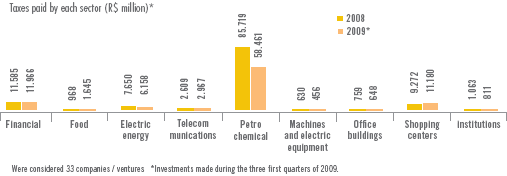
Sectoral aspects concerning sustainability
Despite having the attention and consideration dedicated to sustainability issues in all markets, sectors and countries, evolved considerably, the strategies implemented by companies in that regard are still too diversified and often fragmented. In many instances is missing an approach that would go beyond the simple act of social investment and that would bring the most critical questions of sustainability of each sector to the strategic center of decision-making.
Among the companies in which PREVI invests, those related to the financial sector are the most active in their sustainability strategies. It is quite frequent in that sector the adherence to pacts and international certifications concerning the most urgent social and environmental issues of the global system, such as the adoption of socio-environmental criteria and principles in the management of risks and investments.
In that same sector was also identified a strong activity in governance procedures, in the promotion of the banking and financial inclusion of their population, and in the implementation of processes related to the emission of Greenhouse Effect Gases ("GEE") and its reduction.
The energy sector is another field where significant strategies in that regard also stand out. The companies in this sector have been addressing the sustainability issues as basic criteria and as fundamental premises with which conform their strategic planning processes. The basic approach adopted by all companies of that sector is, undoubtedly, focused on the development of alternative sources of energy, on the rationalization of the use of electric energy, and in processing changes in the energy matrix of their regions.
In companies pertaining to the petrochemical sector most of them look for new management models aiming at the inclusion of the sustainability concept as a premise for their activities.
In the companies of other sectors in which PREVI participates, there is little or no cohesion with regard to sustainability. In many instance that is due to the fact that just one company of a given sector is comprehended in this report.
Even so, it is worth pointing out a few of the issues which have been focused by those companies, such as the involvement or nearly all of them in the development of the communities where they are established. Such involvement is materialized through social investment actions, by promoting volunteer work activities, and by a more intense engagement in the questions latent in each community.
It has also been quite comprehensive the attention given to the environmental issues, ranging from recycling programs, management of residue disposal and environmental education programs, until, in some instances, the elaboration of inventories concerning the emission of greenhouse effect gases , and the development of programs aiming at the reduction of those emissions.
Despite the environmental issues having been particularly focused during these last few years, most of the companies surveyed show a trend to direct their social action investments, particularly those committed to be applied outside their workplace, to the communities in which they are established. Very seldom were heard any opinions towards investing those funds on behalf of promoting diversity in the workforce, even after the presentation of many programs aiming at the qualification of employees.